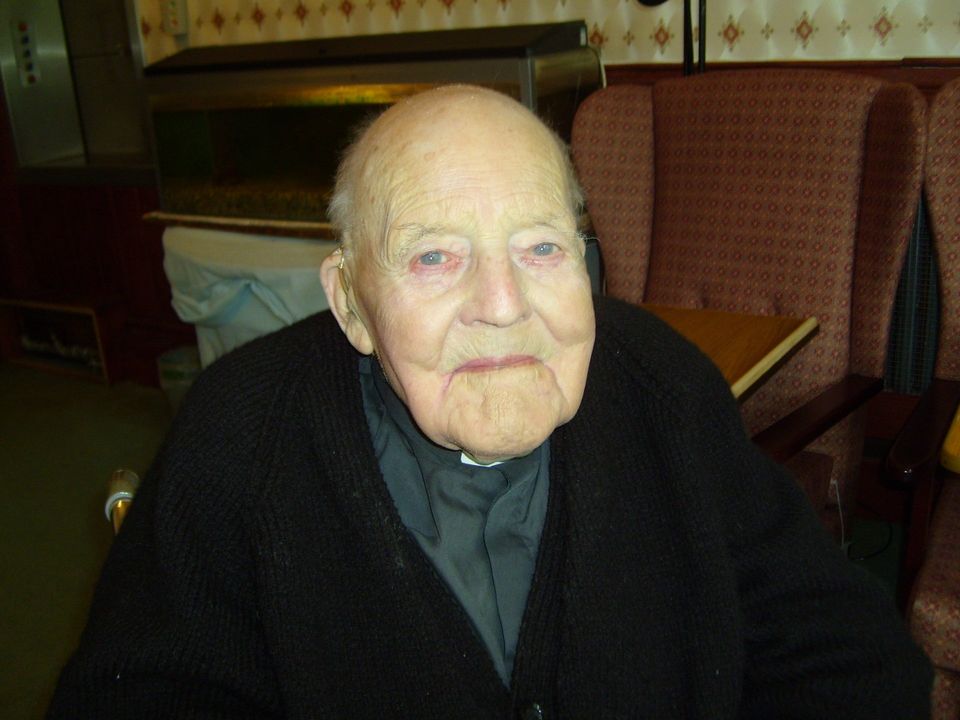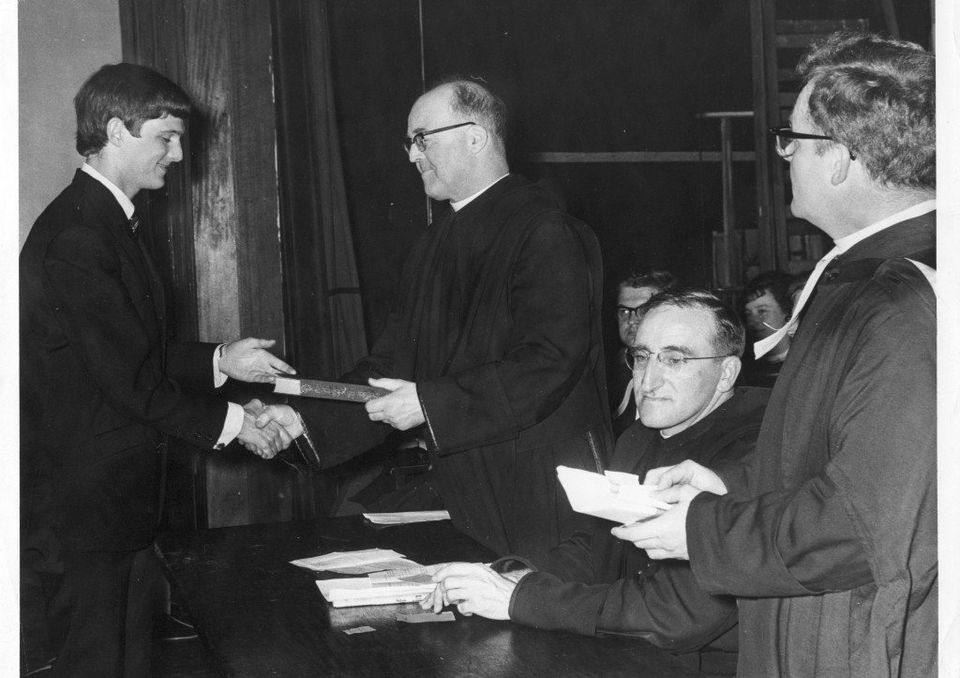Dom Hugh Menken
Dom Hugh spent a large part of his life at Belmont's school of Alderwasley in Derbyshire and then Llanarth. He was appointed Cathedral Prior of Worcester. He died on 6th November 2007.
“They who trust in God will understand the truth, those who are faithful will live with him in love; for grace and mercy await those he has chosen.” These wonderfully consoling words from the Book of Wisdom sum up the life and work of Fr Hugh, whose Requiem we are celebrating today. His trust in God led him to understand the truth, that truth which for most of us is uncomfortable to live with. His faithfulness led him to live every day, every moment with God, in God’s presence, a presence of which most of us fight shy and from which we run away. Now the grace and mercy he knew in this mortal life await him in that eternal life for which he longed and for which he was so well prepared.
When I came to Belmont as a
postulant in September 1969 and first met Fr Hugh, he appeared to be a somewhat
daunting and severe figure. It was during that short break as Headmaster of
Alderwasley. Together with Fr Hilary he was chosen by Abbot Robert to conduct
the official interview with the future novices and fill in the necessary forms.
It’s very different now! I was asked my full names and answered, “Robert
Maurice Paul”. Fr Hugh looked at me with that penetrating glance of his and
said, “Ominous, dear brother. Robert is the present abbot and Maurice the
previous abbot. One day you will be abbot.” I should have left there and then,
but he added, with a mischievous twinkle in his eye, “So make sure you say your
prayers.”
Ernest August Theodor Maria Menken
was born in Liverpool on the feast of St Rose of Lima 1910 of a German father
and an English mother, a Lightbound, whose family has given many vocations to
the Church. Abbot Anselm was his uncle. He had the good looks of a German and
the intelligence of a Lancastrian. It was Dom Bernard Orchard of Ealing who
told me that he and Fr Hugh were at prep school together in Devon, a rather
unusual and irregular school. The amazing thing is that they never set eyes on
each other again, although both were EBC monks for well over seventy years. Fr
Hugh went on to the Oratory School, while Fr Bernard went to Downside.
At the age of twenty he came to Belmont to try
his vocation and was clothed by Abbot Aelred Kindersley on the eve of the
Immaculate Conception 1930. He was given the name Hugh in honour of St Hugh of
Lincoln, who died on this very day in the year 1200 and whose feast we
celebrate tomorrow. Fr Hugh is the only monk of Belmont to have lived under all
eleven abbots, and, needless to say, he had memories about them all, one or two
in particular. He made his First Profession on 8th December 1931 and
was solemnly professed by Abbot Romuald Leonard on 11th July 1936.
He was ordained to the priesthood together with Fr Raymund, Fr Martin and Fr
Bruno by Archbishop McGrath on 7th July 1940. From his Solemn
Profession until 1948 he served the Community as guest master, infirmarian and
lay brother master, and also taught in the school. He had read History at
Oxford and his love of history remained with him until those final days when
his eyesight failed him. Indeed, to the end his retained his youthful good
looks and quick, inquisitive mind. You always felt you were with a
contemporary, not with an old man, or rather an elderly gentleman. He was
always charming and exquisitely polite, and he really knew how to treat a lady.
During the war, from 1940 to 1946,
Fr Hugh was leading fireman of the Belmont Abbey National Fire Service. Only
last year the Hereford Times published a fascinating article based on an interview
with Fr Hugh. Now, as we all know, he didn’t much care for political
correctness or for liberal theology, for that matter, – he lived too close to
the truth and felt there was no harm in calling a spade a spade as long as you
did so politely – but he did chuckle with amusement at seeing himself described
as a fire-fighter.
In 1948 he was appointed Headmaster
of Belmont, but in 1950 he was chosen to lead the team of monks sent to take
over Mr James’ prep school at Alderwasley Hall, Derbyshire. He was to remain
there, apart from the slight hiccup of 1969, until its closure in 1974. He
loved the Hall dearly and was immensely happy there, indeed he always described
his twenty five years there as the happiest years of his life. Although a firm
disciplinarian, he ruled with love and kindness. Judging from the many
tributes, which have poured in this past week from countless Old Boys, it must
have been a very happy school indeed.
Fr Hugh felt let down and was deeply
saddened by the closure of Alderwasley, at that time his life’s work. He
considered this to have been a grave mistake, a wrong decision taken by the
Belmont Community, and one that began the fateful drift towards the closure of
the Abbey School twenty years later. So he chose not to remain at Belmont,
where he felt there was nothing for him to do. Instead he was loaned to the
Archdiocese of Birmingham and became Administrator of the Parish of Great
Haywood, not far from Colwich and Oulton. At Great Haywood, as elsewhere, he
made many friends, which was one of the reasons he eventually retired to
Oulton, at the kind invitation of Mother Benedicta, in December 2006. Here he
was pleased to receive many visitors, among them Old Boys of Alderwasley and
Llanarth and former parishioners.
Fr Hugh was not a man to bear
grudges. He was a true Christian and a gentleman and able to do what few of us
can – always be courteous, and forgive. He might not forget, but he always
forgave. In 1977, at Abbot Jerome’s request, he went as Prior to Llanarth Court
(Alderwasley’s rival and the immediate cause of its closure). At the same time
the Abbot President appointed him Cathedral Prior of Worcester. Fr Denis drove
him over to Worcester Cathedral, where he duly if surreptitiously took
possession of the Prior’s stall. But history was to repeat itself, because in
1986 the Belmont Community decided to close the school at Llanarth and set up a
junior house at Belmont.
In those days there was much
discussion in the Community on the subject of manpower. Fr Hugh diagnosed this
to be a lack of faith in Divine Providence and in God’s will, pointing out, and
I quote: “The Church has been, is and will always be stretched in its manpower.
Our Lord foretold this, “The harvest is rich but the labourers are few.” His
solution was not tinkering with numbers or contracting obligations – worldly
solutions – but prayer, a spiritual solution. “Ask the Lord of the harvest to
send labourers into his harvest.” God intends his few labourers to be stretched
in their service of Him. Without reinforcements it means dependence upon Him,
trust in Him. There is no lasting earthly solution for this problem; we have to
depend on God’s generosity.”
In 1986, then, Fr Hugh was sent to
St Begh’s as curate and here he was to remain well beyond retirement age, until
he went to Oulton, as he put it, “to prepare for death and judgement.” If his
twenty five years at Alderwasley were the happiest days of his life, so too
were the twenty years spent at St Begh’s. He fell in love with the people of
Whitehaven and they fell in love with him. There was a very special bond
between them, something only God’s love can create. Fr Hugh especially loved
celebrating Mass at Quay St and hearing confessions. He took great care of the
sick, visiting their homes and bringing them Communion. “My old folk” he called
them, yet some of them were young enough to be his children!
And so we must bring this brief
reflection to an end. Let us return to the Scripture readings we heard this
afternoon, because they really sum up Fr Hugh’s faith and his legacy to us all.
“Nothing,” writes St Paul, “can separate us from the love of God made visible
in Christ Jesus our Lord.” Fr Hugh was convinced of God’s love for us his
children. His only fear was that we often take that love for granted. He would
ask me, with extraordinary humility and simplicity, “Fr Abbot, how can I love
God more? I know he loves me so much and I do so long to love him more.”
He also believed in prayer. Of
course, he read books, many books, he enjoyed sport, playing and coaching in
youth and middle age, watching and supporting in later life, he enjoyed his
food – he was a dab hand with the frying pan and attributed his longevity and
good health to his daily fry-up – he enjoyed holidays and travel, he enjoyed
the fine things of life and enjoyed life to the full. But he also prayed, and
prayed a great deal. He was faithful to his daily Mass and Divine Office, for
which he prepared and made thanksgiving before the Blessed Sacrament. He was
meticulous about his spiritual reading and mental prayer. He was devoted to Our
Lady and the saints, especially the English Martyrs, and he loved the Rosary. He
prayed constantly for the Holy Souls. He firmly believed those words of St
Paul, “Since God did not spare his own Son, but gave him up to benefit us all,
we may be certain, after such a gift, that he will not refuse anything he can
give.”
Above all he was conscious of the
tremendous honour God had bestowed so graciously upon him by calling him to the
priesthood and the monastic life. Like Jesus himself Fr Hugh could say,
“Everything has been entrusted to me by my Father.” And like Jesus, though
energetic and powerful at times, he could also be “gentle and humble of heart”.
Confident, then, in God’s mercy and love we now pray that he may “find rest for
his soul”. Requiescat in pace. Amen











